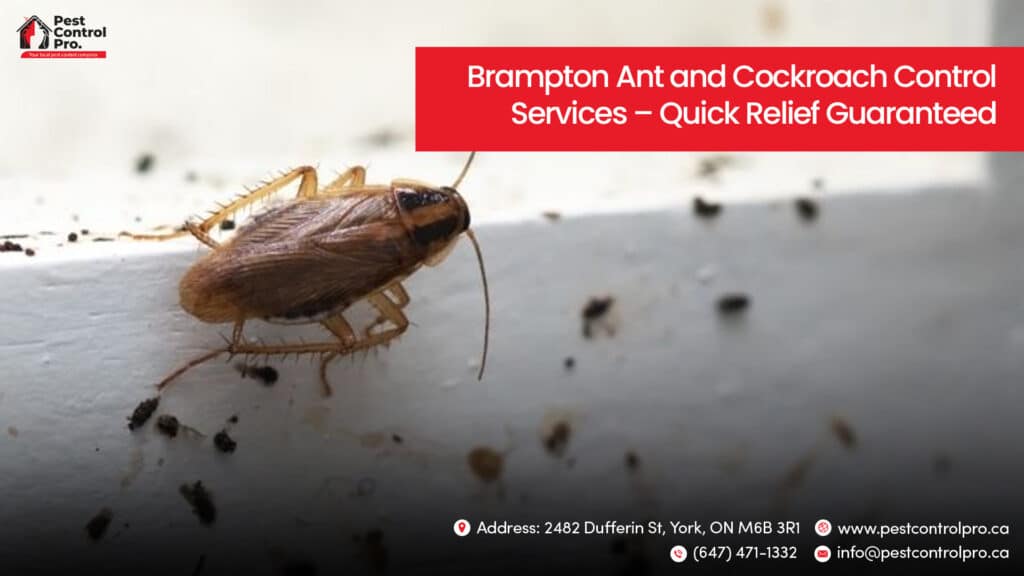As a property manager in Toronto, you must ensure your properties comply with Ontario’s pest control regulations. This means creating pest-free environments. You should adopt Integrated Pest Management (IPM) strategies, which focus on long-term prevention and control. Conduct regular inspections to identify potential pest issues early. Engaging your tenants in pest prevention is key; educate them on how to keep their spaces clean and pest-free.
Encourage tenants to report any signs of pests promptly. This collaborative approach fosters a sense of community and responsibility. Keeping detailed records of your pest management activities is essential. It not only helps in tracking pest issues but also in demonstrating compliance with regulations.
Did you know that a single cockroach can produce over 30,000 eggs in a year? This fact highlights the importance of being proactive in pest management. Stay informed about new pest control practices and emerging challenges in the industry. By prioritizing pest control, you’re not just maintaining your properties; you’re safeguarding the health and well-being of your tenants.
Understanding Pest Control Regulations in Ontario
In Ontario, knowing the pest control regulations is essential for managing rental properties. The Residential Tenancies Act requires you to keep your properties free from pests.
When tenants report pest issues, you must act quickly. This means hiring licensed pest control services to handle the problem professionally. Keeping detailed records of all pest control activities is also necessary to comply with local laws.
You should consider using an Integrated Pest Management (IPM) approach. This method allows you to prevent pest problems before they start and monitor any activity effectively.
By doing this, you ensure compliance with regulations and enhance tenant satisfaction, which is crucial for maintaining the value of your property.
Did you know that a single cockroach can produce up to 30,000 offspring in a year? This fact highlights the importance of being proactive about pest control.
As a property manager, staying updated on pest control regulations and best practices is vital. This will help you avoid penalties and fulfill your responsibilities effectively.
Key Responsibilities of Property Managers
As a property manager, your primary responsibility is to keep your rental properties free from pests while adhering to the Residential Tenancies Act (RTA). This means you need to hire licensed pest control technicians to handle any infestations swiftly.
Keeping meticulous records of all pest management actions is crucial for demonstrating compliance with the RTA.
Regular inspections of both rental units and common areas—ideally every 30 days—are vital to catch any potential pest issues before they escalate. It’s also important to educate your tenants about their role in maintaining a pest-free environment.
Encourage them to keep their spaces clean and to report any signs of pests immediately.
By establishing solid maintenance plans and fostering open lines of communication with your tenants, you can ensure a pest-free living experience. This not only boosts tenant satisfaction but also minimizes the likelihood of disputes related to pest issues.
Did you know that a single pair of mice can produce up to 10 litters a year? Staying proactive is key to preventing such problems!
Integrated Pest Management (IPM) Strategies
To manage pest problems effectively, adopt Integrated Pest Management (IPM) strategies. These strategies blend prevention, monitoring, and treatment.
As a property owner, you can prevent pests from invading by sealing entry points, maintaining cleanliness, and managing humidity levels. These methods create an environment that discourages pests.
Regular inspections are essential. They help you spot early signs of pest activity, allowing for prompt action. Communication is key; keep your tenants informed about your pest prevention measures. This fosters cooperation and awareness.
Consider hiring licensed pest control experts. They’ve the training and tools to handle infestations safely and effectively.
Document all pest control activities. This not only helps you track interventions but also ensures compliance with health regulations, minimizing risks associated with pesticide use.
Did you know that some common household pests can reproduce rapidly? For example, a single cockroach can produce up to 300 offspring in a year!
Importance of Regular Inspections and Maintenance
Regular inspections and maintenance are crucial for ensuring your rental properties in Toronto remain free from pests and adhere to local regulations. Conduct inspections at least once every 30 days, paying close attention to common areas and high-risk zones, such as kitchens and bathrooms.
This proactive strategy allows you to identify pest issues before they escalate, ensuring compliance with property standards.
To strengthen your maintenance plan, consider focusing on the following:
- Moisture control: Excess moisture can lead to infestations. Keep your properties dry and well-ventilated.
- Sanitation practices: Regular cleaning helps maintain a spotless environment, reducing the risk of attracting pests.
- Documentation: Keep detailed records of your inspection findings. This assists in effective management and clarifies tenant responsibilities.
Did you know that a single cockroach can produce up to 30,000 offspring in its lifetime?
That’s why staying ahead of pest problems is essential. By implementing these strategies, you’ll protect your properties and keep your tenants happy.
Tenant Engagement and Cooperation
Engaging tenants in pest prevention is crucial for maintaining a pest-free environment in your apartment complex. When you educate residents about proper sanitation, you’re helping to minimize the chances of infestations.
Promptly reporting any pest sightings is key; this way, issues can be addressed before they escalate. By fostering open communication, you encourage tenants to share their concerns quickly.
Regular updates about pest control measures not only keep everyone informed but also create a sense of community and shared responsibility for a clean living space.
Providing straightforward cleanliness guidelines and tips for sealing potential entry points will enhance tenant cooperation. You can also encourage participation in periodic pest management meetings.
This collaborative approach allows everyone to identify and tackle potential issues together, ensuring a healthier living environment for all.
Did you know that a single cockroach can produce up to 30,000 offspring in a year? That’s why it’s vital to act swiftly and effectively.
Together, let’s create a pest-free space you can be proud to call home.
Emerging Trends and Challenges in Pest Management
Pest management is evolving, and staying ahead is crucial for effective prevention. Urbanization is bringing new pest species into our communities, making it essential for you to keep an eye on emerging threats and adapt your strategies accordingly. Climate change is also playing a role, as it extends breeding seasons for many pests, highlighting the need for regular inspections.
To tackle these challenges, focus on these key areas:
- Integrated Pest Management (IPM): Choose sustainable methods that prioritize the environment over harsh chemicals. This approach not only protects ecosystems but also ensures a healthier living space for tenants.
- Advances in Pest Control Technology: Embrace smart monitoring systems. These tools allow for proactive management, helping you detect and address pest issues before they escalate.
- Compliance with Regulations: Maintain thorough documentation and adhere to tenant safety standards. This not only protects your tenants but also aligns with legal requirements.
Did you know that certain pests can reproduce at alarming rates? For instance, a single female German cockroach can produce up to 400 offspring in her lifetime.
Frequently Asked Questions
What Is the Future of Pest Control?
The future of pest control is bright! You will see smart technologies transforming how we tackle infestations. These innovations include integrated pest management, which focuses on prevention and monitoring, ensuring a more effective approach. You’ll also witness the rise of drone inspections, allowing for quick and accurate assessments of hard-to-reach areas.
Sustainability is key. Bio-based treatments will replace harsh chemicals, promoting a healthier environment. Engaging tenants in this process will be crucial; they’ll play a vital role in reporting issues early and maintaining pest-free spaces.
Did you know that urban biodiversity can flourish when we implement preventative measures? By adapting to regulatory changes, you’ll not only manage pests effectively but also help support local ecosystems. So, as a pest control professional, you will be at the forefront of creating healthier, more sustainable living environments.
What Is the Landlord’s Responsibility for Pest Control in Ontario?
In Ontario, landlords are responsible for pest control. This means you must take steps to prevent infestations and comply with health regulations. Your obligations include regular inspections, prompt action when pests are reported, and maintaining a clean environment. Failing to address pest issues can not only lead to tenant dissatisfaction but also potential eviction processes and health risks.
Did you know that pests like bedbugs can reproduce rapidly? A single female can lay hundreds of eggs. As a pest control professional, I recommend staying proactive. Regular maintenance and open communication with your tenants can help keep your properties pest-free. Remember, a healthy living space benefits everyone involved!
Can I Refuse Pest Control in My Apartment in Ontario?
In Ontario, you cannot refuse pest control in your apartment. Landlords must ensure a pest-free environment, and as a tenant, it’s your responsibility to cooperate. By submitting maintenance requests, you help address health concerns and avoid potential eviction issues.
Did you know that pests like bedbugs can reproduce quickly, with a female laying up to 500 eggs in her lifetime? That’s why timely pest control is crucial! When your landlord arranges for pest control, it’s in everyone’s best interest to comply, ensuring a safe and healthy living space for you and your neighbors.
What Is the Market Outlook for Pest Control?
The market outlook for pest control is promising as urban pest issues continue to rise. You will notice a growing trend in integrating technology with eco-friendly solutions. This combination helps you tackle seasonal challenges more effectively and adapt to changing regulations. Additionally, you can refine your service pricing, moving beyond outdated DIY methods that often fall short.
Did you know that the global pest control market is expected to reach over $29 billion by 2026? This growth reflects the increasing demand for professional pest management services. As a pest control pro, you have the opportunity to stay ahead by embracing these trends. Focus on providing effective and sustainable solutions to meet your clients’ needs.



